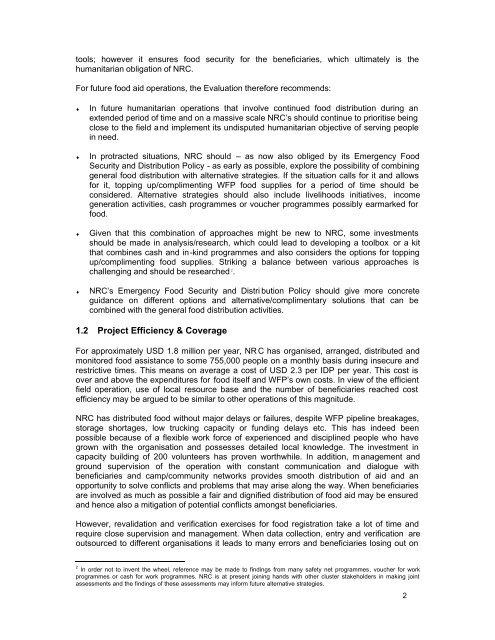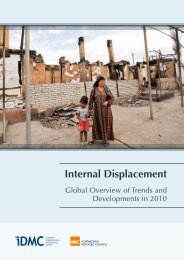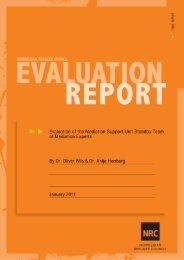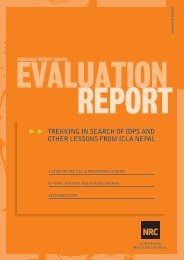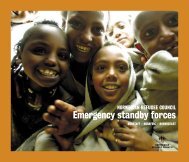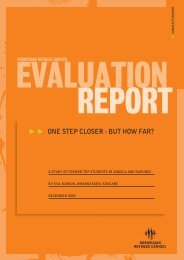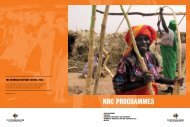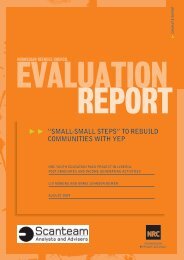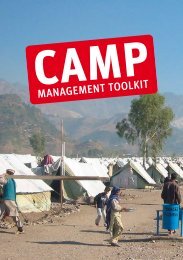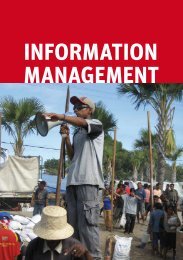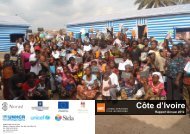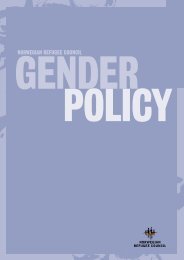evaluation of general food distribution in northern uganda: gulu ...
evaluation of general food distribution in northern uganda: gulu ...
evaluation of general food distribution in northern uganda: gulu ...
Create successful ePaper yourself
Turn your PDF publications into a flip-book with our unique Google optimized e-Paper software.
tools; however it ensures <strong>food</strong> security for the beneficiaries, which ultimately is thehumanitarian obligation <strong>of</strong> NRC.For future <strong>food</strong> aid operations, the Evaluation therefore recommends:♦♦♦♦In future humanitarian operations that <strong>in</strong>volve cont<strong>in</strong>ued <strong>food</strong> <strong>distribution</strong> dur<strong>in</strong>g anextended period <strong>of</strong> time and on a massive scale NRC’s should cont<strong>in</strong>ue to prioritise be<strong>in</strong>gclose to the field and implement its undisputed humanitarian objective <strong>of</strong> serv<strong>in</strong>g people<strong>in</strong> need.In protracted situations, NRC should – as now also obliged by its Emergency FoodSecurity and Distribution Policy - as early as possible, explore the possibility <strong>of</strong> comb<strong>in</strong><strong>in</strong>g<strong>general</strong> <strong>food</strong> <strong>distribution</strong> with alternative strategies. If the situation calls for it and allowsfor it, topp<strong>in</strong>g up/compliment<strong>in</strong>g WFP <strong>food</strong> supplies for a period <strong>of</strong> time should beconsidered. Alternative strategies should also <strong>in</strong>clude livelihoods <strong>in</strong>itiatives, <strong>in</strong>comegeneration activities, cash programmes or voucher programmes possibly earmarked for<strong>food</strong>.Given that this comb<strong>in</strong>ation <strong>of</strong> approaches might be new to NRC, some <strong>in</strong>vestmentsshould be made <strong>in</strong> analysis/research, which could lead to develop<strong>in</strong>g a toolbox or a kitthat comb<strong>in</strong>es cash and <strong>in</strong>-k<strong>in</strong>d programmes and also considers the options for topp<strong>in</strong>gup/compliment<strong>in</strong>g <strong>food</strong> supplies. Strik<strong>in</strong>g a balance between various approaches ischalleng<strong>in</strong>g and should be researched 2 .NRC’s Emergency Food Security and Distri bution Policy should give more concreteguidance on different options and alternative/complimentary solutions that can becomb<strong>in</strong>ed with the <strong>general</strong> <strong>food</strong> <strong>distribution</strong> activities.1.2 Project Efficiency & CoverageFor approximately USD 1.8 million per year, NR C has organised, arranged, distributed andmonitored <strong>food</strong> assistance to some 755,000 people on a monthly basis dur<strong>in</strong>g <strong>in</strong>secure andrestrictive times. This means on average a cost <strong>of</strong> USD 2.3 per IDP per year. This cost isover and above the expenditures for <strong>food</strong> itself and WFP’s own costs. In view <strong>of</strong> the efficientfield operation, use <strong>of</strong> local resource base and the number <strong>of</strong> beneficiaries reached costefficiency may be argued to be similar to other operations <strong>of</strong> this magnitude.NRC has distributed <strong>food</strong> without major delays or failures, despite WFP pipel<strong>in</strong>e breakages,storage shortages, low truck<strong>in</strong>g capacity or fund<strong>in</strong>g delays etc. This has <strong>in</strong>deed beenpossible because <strong>of</strong> a flexible work force <strong>of</strong> experienced and discipl<strong>in</strong>ed people who havegrown with the organisation and possesses detailed local knowledge. The <strong>in</strong>vestment <strong>in</strong>capacity build<strong>in</strong>g <strong>of</strong> 200 volunteers has proven worthwhile. In addition, m anagement andground supervision <strong>of</strong> the operation with constant communication and dialogue withbeneficiaries and camp/community networks provides smooth <strong>distribution</strong> <strong>of</strong> aid and anopportunity to solve conflicts and problems that may arise along the way. When beneficiariesare <strong>in</strong>volved as much as possible a fair and dignified <strong>distribution</strong> <strong>of</strong> <strong>food</strong> aid may be ensuredand hence also a mitigation <strong>of</strong> potential conflicts amongst beneficiaries.However, revalidation and verification exercises for <strong>food</strong> registration take a lot <strong>of</strong> time andrequire close supervision and management. When data collection, entry and verification areoutsourced to different organisations it leads to many errors and beneficiaries los<strong>in</strong>g out on2In order not to <strong>in</strong>vent the wheel, reference may be made to f<strong>in</strong>d<strong>in</strong>gs from many safety net programmes, voucher for workprogrammes or cash for work programmes. NRC is at present jo<strong>in</strong><strong>in</strong>g hands with other cluster stakeholders <strong>in</strong> mak<strong>in</strong>g jo<strong>in</strong>tassessments and the f<strong>in</strong>d<strong>in</strong>gs <strong>of</strong> these assessments may <strong>in</strong>form future alternative strategies.2


